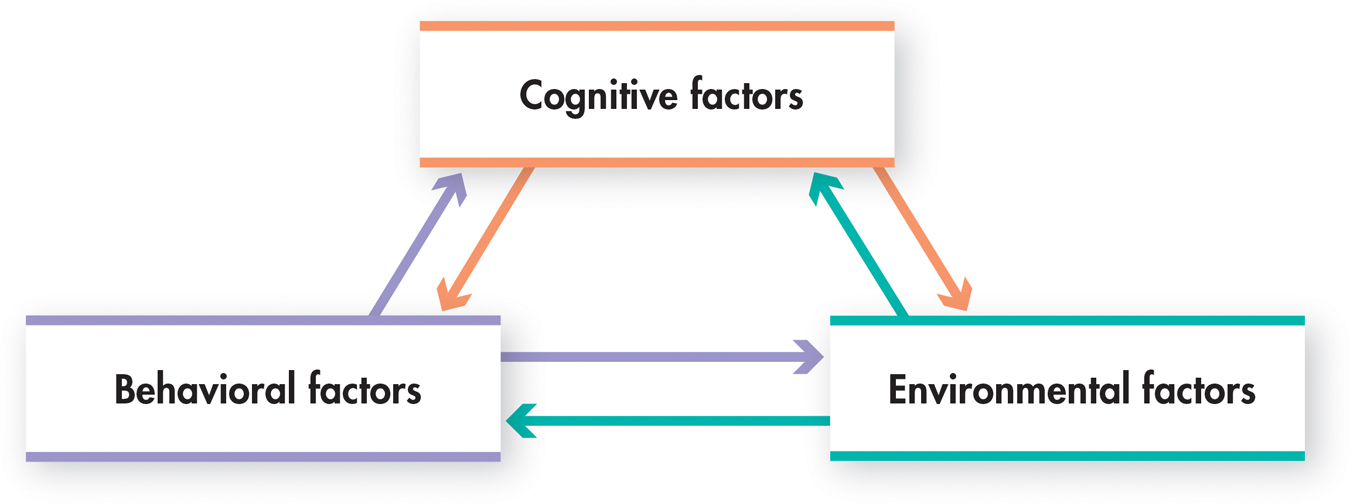11.4 The Social Cognitive Perspective on Personality
KEY THEME
The social cognitive perspective stresses conscious thought processes, self-regulation, and the importance of situational influences.
KEY QUESTIONS
What is the principle of reciprocal determination?
What is the role of self-efficacy beliefs in personality?
What are the key strengths and weaknesses of the social cognitive perspective?
Have you ever noticed how different your behavior and sense of self can be in different situations? Consider this example: You feel pretty confident as you enter your English composition class. After all, you’re pulling an A, and your prof nods approvingly every time you participate in the class discussion, which you do frequently. In contrast, your college algebra class is a disaster. You’re worried about passing the course, and you feel so shaky about your skills that you’re afraid to even ask a question, much less participate in class. Even a casual observer would notice how differently you behave in the two different situations—speaking freely and confidently in one class, staring at your desk in hopes that your instructor won’t notice you in the other.
The idea that a person’s conscious thought processes in different situations strongly influence his or her actions is one important characteristic of the social cognitive perspective on personality (Cervone & others, 2011). According to the social cognitive perspective, people actively process information from their social experiences. This information influences their goals, expectations, beliefs, and behavior, as well as the specific environments they choose.
The social cognitive perspective differs from psychoanalytic and humanistic perspectives in several ways. First, rather than basing their approach on self-analysis or insights derived from psychotherapy, social cognitive personality theorists rely heavily on experimental findings. Second, the social cognitive perspective emphasizes conscious, self-regulated behavior rather than unconscious mental influences and instinctual drives. And third, as in our English-versus-algebra-class example, the social cognitive approach emphasizes that our sense of self can vary, depending on our thoughts, feelings, and behaviors in a given situation.
Albert Bandura and Social Cognitive Theory
Although several contemporary personality theorists have embraced the social cognitive approach to explaining personality, probably the most influential is Albert Bandura (b. 1925). We examined Bandura’s classic research on observational learning in Chapter 5. In Chapter 8, we encountered Bandura’s more recent research on self-efficacy. Here, you’ll see how Bandura’s ideas on both these topics are reflected in his personality theory, called social cognitive theory. Social cognitive theory emphasizes the social origins of thoughts and actions but also stresses active cognitive processes and the human capacity for self-regulation (Bandura, 2004b, 2006).
social cognitive theory
Albert Bandura’s theory of personality, which emphasizes the importance of observational learning, conscious cognitive processes, social experiences, self-efficacy beliefs, and reciprocal determinism.
As Bandura’s early research demonstrated, we learn many behaviors by observing, and then imitating, the behavior of other people. But, as Bandura (1997) has pointed out, we don’t merely observe people’s actions. We also observe the consequences that follow people’s actions, the rules and standards that apply to behavior in specific situations, and the ways in which people regulate their own behavior. Thus, environmental influences are important, but conscious, self-generated goals and standards also exert considerable control over thoughts, feelings, and actions (Bandura, 2001).

The capacity to exercise control over the nature and quality of life is the essence of humanness. Unless people believe they can produce desired results and forestall detrimental ones by their actions, they have little incentive to act or persevere in the face of difficulties.
—Albert Bandura (2001)
For example, consider your own goal of getting a college education. No doubt many social and environmental factors influenced your decision. In turn, your conscious decision to attend college determines many aspects of your current behavior, thoughts, and emotions. And your goal of attending college classes determines which environments you choose.
Bandura (1986, 1997) explains human behavior and personality as being caused by the interaction of behavioral, cognitive, and environmental factors. He calls this process reciprocal determinism (see FIGURE 11.2). According to this principle, each factor both influences the other factors and is influenced by the other factors. Thus, in Bandura’s view, our environment influences our thoughts and actions, our thoughts influence our actions and the environments we choose, our actions influence our thoughts and the environments we choose, and so on in a circular fashion.
reciprocal determinism
A model proposed by psychologist Albert Bandura that explains human functioning and personality as caused by the interaction of behavioral, cognitive, and environmental factors.

BELIEFS OF SELF-EFFICACY
Collectively, a person’s cognitive skills, abilities, and attitudes represent the person’s self-system. According to Bandura (2001), it is our self-system that guides how we perceive, evaluate, and control our behavior in different situations. Bandura (2004b) has found that the most critical elements influencing the self-system are our beliefs of self-efficacy. Self-efficacy refers to the degree to which you are subjectively convinced of your own capabilities and effectiveness in meeting the demands of a particular situation.
self-efficacy
The beliefs that people have about their ability to meet the demands of a specific situation; feelings of self-confidence.

CRITICAL THINKING
Freud Versus Bandura on Human Aggression

Freud viewed aggression as a universal, unconscious human instinct that must be controlled by the internal restraints of the superego and the external restraints of culture, society, and morality. In Freud’s eyes, aggressive instincts were part of the irrational, impulsive, and unconscious id. Social cognitive theorists, however, discount the importance of unconscious instincts or motives. Instead, they emphasize that behavior is driven by conscious goals and motives. Not surprisingly, Albert Bandura has taken issue with Freud’s explanation of war and cruelty as being caused by the failure of the rational ego, the superego’s restraints, and society’s laws to control the id’s destructive impulses (see the Critical Thinking box, “Freud Versus Rogers on Human Nature”). Bandura (1986) has noted that some of the most horrifying examples of human cruelty have involved conscious, rational behavior:
People frequently engage in destructive activities, not because of reduced self-control, but because their cognitive skills and self-control are too well enlisted through moral justification and self-exonerative devices in the service of destructive causes. The infamous extermination procedures of Nazi concentration camps were perfected in laboratories using human victims. In the Nazi value system, where the enslavement and execution of Jewish people were viewed as meritorious acts of patriotism, camp commandants proudly compared execution rates as if they were industrial production figures. This monstrous death industry required a methodical program of research and efficient and dedicated management. The massive threats to human welfare are generally brought about by deliberate acts of principle, rather than unrestrained acts of impulse.
Given Freud and Bandura’s differing views, what do you think?
CRITICAL THINKING QUESTIONS
Are violence, aggression, and cruelty the result of the unleashing of uncontrolled unconscious forces, or of deliberate, conscious decisions?
Consider a contemporary conflict or atrocity. How would Freud and Bandura explain people’s behavior?
In your opinion, which theorist’s explanation seems more accurate?
The most effective way of developing a strong sense of efficacy is through mastery experiences. Successes build a robust belief in one’s efficacy. Failures undermine it. A second way is through social modeling. If people see others like themselves succeed by sustained effort, they come to believe that they, too, have the capacity to do so. Social persuasion is a third way of strengthening people’s beliefs in their efficacy. If people are persuaded that they have what it takes to succeed, they exert more effort than if they harbor self-doubts and dwell on personal deficiencies when problems arise.
—Albert Bandura (2004b)
For example, suppose you were faced with the problem of filling out paperwork for financial aid. Your sense of self-efficacy about finances and paperwork would affect your behavior and your fears of failure or hopes of success (Bandura, 1992; Ozer & Bandura, 1990). If you completely lacked a sense of self-efficacy in this arena, you might even quit before you began, regardless of whether you were actually capable of completing the paperwork. Bandura’s concept of self-efficacy makes it easier to understand why people often fail to perform optimally at certain tasks, even though they possess the necessary skills.
However, our self-system is very flexible. How we regard ourselves and our abilities varies depending on the situations or tasks we’re facing. In turn, our beliefs influence the tasks we are willing to try and how persistent we’ll be in the face of obstacles (Bandura, 1996, 2004b).
We can acquire new behaviors and strengthen our beliefs of self-efficacy in particular situations through observational learning and mastery experiences (Bandura, 2001, 2004b). When we perform a task successfully, our sense of self-efficacy becomes stronger. When we fail to deal effectively with a particular task or situation, our sense of self-efficacy is undermined.
From very early in life, children develop feelings of self-efficacy from their experiences in dealing with different tasks and situations, such as athletic, social, and academic activities (Bandura & others, 2003). As Bandura (1992) has pointed out, developing self-efficacy begins in childhood, but it continues as a lifelong process. Each stage of the lifespan presents new challenges.
Evaluating the Social Cognitive Perspective on Personality
A key strength of the social cognitive perspective on personality is its grounding in empirical, laboratory research (Bandura, 2004a). The social cognitive perspective is built on research in learning, cognitive psychology, and social psychology, rather than on clinical impressions. And, unlike vague psychoanalytic and humanistic concepts, the concepts of social cognitive theory are scientifically testable—that is, they can be operationally defined and measured. For example, psychologists can study beliefs of self-efficacy by comparing subjects who are low in self-efficacy in a given situation with subjects who are high in self-efficacy (see Ozer & Bandura, 1990). Not surprisingly, then, the social cognitive perspective has had a major impact on the study of personality.
However, some psychologists feel that the social cognitive approach to personality applies best to laboratory research. In the typical laboratory study, the relationships among a limited number of very specific variables are studied. In everyday life, situations are far more complex, with multiple factors converging to affect behavior and personality. Thus, an argument can be made that clinical data, rather than laboratory data, may be more reflective of human personality.
The social cognitive perspective also ignores unconscious influences, emotions, or conflicts. Some psychologists argue that the social cognitive theory focuses on very limited areas of personality—learning, the effects of situations, and the effects of beliefs about the self. Thus, it seems to lack the richness of psychoanalytic and humanistic theories, which strive to explain the whole person, including the unconscious, irrational, and emotional aspects of personality (McAdams & Pals, 2006; Westen, 1990).
Nevertheless, by emphasizing the reciprocal interaction of mental, behavioral, and situational factors, the social cognitive perspective recognizes the complex combination of factors that influence our everyday behavior. By emphasizing the important role of learning, especially observational learning, the social cognitive perspective offers a developmental explanation of human functioning that persists throughout one’s lifetime. Finally, by emphasizing the self-regulation of behavior, the social cognitive perspective places most of the responsibility for our behavior—and for the consequences we experience—squarely on our own shoulders.
CONCEPT REVIEW 11.3
Determine whether each of the following statements is true or false.